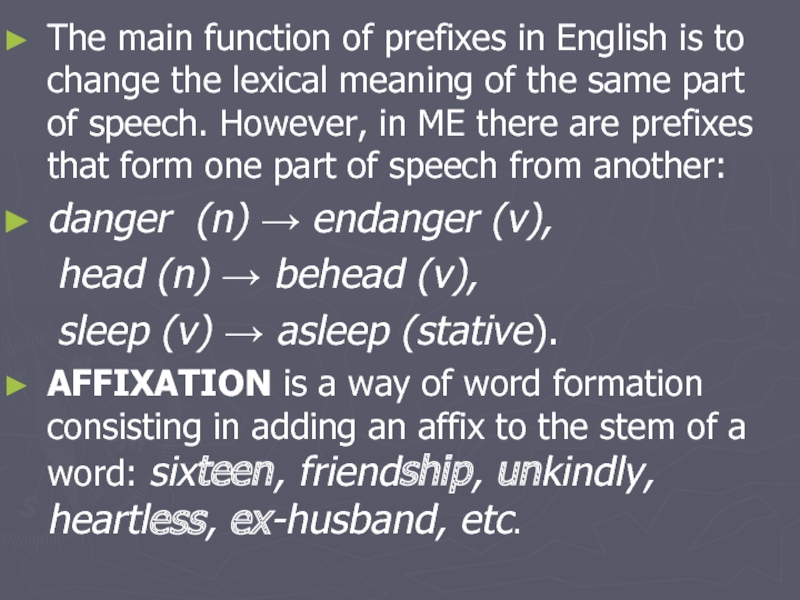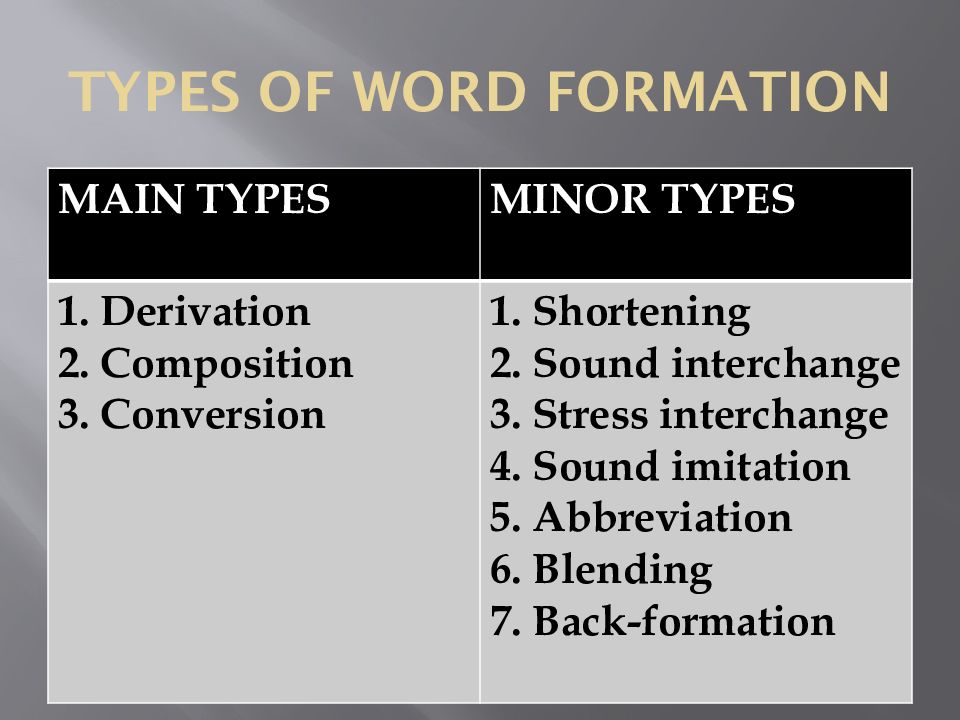Скачать материал

Скачать материал


- Сейчас обучается 226 человек из 56 регионов


- Сейчас обучается 190 человек из 44 регионов


- Сейчас обучается 1387 человек из 83 регионов


Описание презентации по отдельным слайдам:
-
1 слайд
Word Formation
Кашина В.Л.,
учитель английского языка
МБОУ «СОШ №1
города Новоалтайска Алтайского края» -
2 слайд
Методическая разработка по теме «Word Formation» составлена к УМК «Spotlight — 7» авторов Ю.Е.Ваулиной, Д.Дули и др.
В первой части презентации содержится теоретическая часть по теме.
Вторая часть представляет собой опыт работы автора по формированию языковой компетенции школьником и содержит систему упражнений к УМК по теме «Word Formation» к модулям 1, 4, 6, 8, 10.
Презентация помогает систематизировать материал по словообразованию по всему курсу 7-го класса, поэтому её можно использовать как к конкретному модулю УМК, так и в конце курса для повторения способов словообразования. -
3 слайд
Цель:
обеспечить условия для систематизации знаний учащихся по теме «Словообразование» за курс 7-го класса посредством создания системы упражнений по теме. -
4 слайд
Задачи:
— ознакомить учащихся со структурой слов и с 3-мя основными способами образования слов (конверсией, словосложением и деривацией);
выработать умение правильно распознавать приставки и суффиксы различных частей речи и определять морфологический состав слов;
формировать и закреплять умение образовывать новые слова с помощью трёх основных способов словообразования и употреблять слова нужной части речи в конкретной речевой ситуации. -
5 слайд
Теоретическая часть
-
6 слайд
Словообразование в английском языке. Word Formation in English
Словарный состав английского языка находится в состоянии непрерывного изменения.
Одна из закономерностей развития словарного состава языка – пополнение его новыми словами. Пополнение это происходит путём образования новых слов – словообразования. В этом процессе проявляется связь словообразования с грамматикой, в частности с морфологией. Новые слова пишутся в соответствии с грамматикой английского языка, по образцу уже имеющихся слов в языке и относятся к определённой части речи. -
7 слайд
Слова по своей структуре в английском языке бывают:
Простые (dark, black, use);
Производные (darkness, blackness, useful, useless, user);
Сложные (dark-blue, blackberry, blackbird, black-board, black and white);
Составные (to get dark, to black out, to use up). -
8 слайд
Основные способы образования слов:
I. Conversion
II. Compounding
III. Derivation -
9 слайд
I. Conversion
is the process of using words from one word class as members of another class, changing stress, replacing syllables.
Конверсия – это процесс использования одного слова
— в разных частях речи (cost – to cost);
— изменение ударения (import – to import);
— замена глухих согласных на звонкие согласные (advice – to advise). -
10 слайд
II. Compounding
is the process of combining two words to form a new word.
Словосложение – это процесс образования нового слова из двух частей. Например: home+work=homeworkrailway, keyboard, airport, fireman
-
11 слайд
III. Derivation
or word formation process which builds new words by adding morphemes (suffixes and prefixes).
Деривация — словопроизводство новых слов различных частей речи с помощью морфем (суффиксов и префиксов). Этот способ словообразования очень распространён в английском языке. -
12 слайд
Образование слов с помощью суффиксов
Суффикс – это часть слова, которая ставится после корня. Слово с суффиксом принимает новое значение и может относиться к другой части речи. -
13 слайд
Образование существительных от глаголов:
1. С помощью суффикса –al (to approve – approval),
2. С помощью суффиксов –ance, ence (to assist – assistance),
3. С помощью суффикса –age (to marry – marriage),
4. С помощью суффикса –ant (to account – accountant),
5. С помощью суффикса –ee (to employ – employee), -
14 слайд
Образование существительных от глаголов: 6. С помощью суффиксов –er, -or (to bake – baker, to act – actor),
7. С помощью суффикса –ery (to cook – cookery),
8. С помощью суффиксов –ion, tion (to act – action, to compete – competition),
9. С помощью суффикса –ment (to develop – development),
10. С помощью суффикса –ness (to sleep – sleepiness),
11. С помощью суффикса –ure (to press – pressure),
12. С помощью суффикса – ing (to act – the acting). -
15 слайд
Образование существительных от прилагательных:
1.с помощью суффикса –dom образовываем существительные со значением состояния или владения (free – freedom),
2.с помощью суффиксов –ance, –ence (different – difference),
3.с помощью суффикса –ity (possible –possibility),
4.с помощью суффикса –ness говорим о состоянии, наличии качества (dark – darkness), -
16 слайд
Образование существительных от прилагательных:
5.с помощью суффикса –ry (brave – bravery),
6.с помощью суффикса –th (deep – depth),
7.с помощью суффиксов –ty (certain – certainty). -
17 слайд
Образование существительных от существительных:
1.с помощью суффикса –ade (block – blockade),
2.с помощью суффикса –ess (actor – actress),
3.с помощью суффиксов –ian, -an (Russia – Russian),
4.с помощью суффикса –dom (king – kingdom),
5.с помощью суффикса –ful (spoon – spoonful), -
18 слайд
Образование существительных от существительных:
6.с помощью суффикса –hood (child — childhood),
7.с помощью суффикса –ism (capital – capitalism),
8.с помощью суффикса –ist (art – artist),
9.с помощью суффикса –ship (friend – friendship),
10.с помощью суффиксов –y, -ie для образования уменьшительных или ласкательных имён (dad — daddy),
11.с помощью суффиксов –ry (slave – slavery), -
19 слайд
Образование прилагательных от глаголов:
1.с помощью суффиксов –able, -ible (to eat — eatable),
2.с помощью суффиксов –ant, -ent (to respond – respondent, to signify – significant),
3.с помощью суффикса –ed (to commit – committed),
4.с помощью суффикса –ful (to doubt – doubtful),
5.с помощью суффикса –ive (to act –active),
6.с помощью суффикса –ous (to vary –various) -
20 слайд
Образование прилагательных от существительных:
1.с помощью суффикса –able (comfort – comfortable),
2.с помощью суффикса –ary (reaction – reactionary),
3.с помощью суффиксов –ic (+ –al) (nation – national),
4.с помощью суффикса –ish (red — reddish),
5.с помощью суффикса –ive (effect – effective), -
21 слайд
Образование прилагательных от существительных:
6.с помощью суффикса –en (wood – wooden),
7.с помощью суффикса –ern (west– western),
8.с помощью суффикса –ful (colour – colourful),
9.с помощью суффикса –less (end — endless),
10.с помощью суффикса –ly (month — monthly),
11.с помощью суффикса –ous (fame — famous),
12.с помощью суффикса –y (sun — sunny). -
22 слайд
Образование глаголов от существительных:
1.с помощью суффикса –ate (alien – to alienate),
2.с помощью суффикса –en (strength – to strengthen),
3.с помощью суффикса –ize (computer – to computerize),
4.с помощью суффикса –(i)fy (gas – to gasify), -
23 слайд
Образование глаголов от прилагательных:
1.с помощью суффикса –en (sweet– to sweeten),
2.с помощью суффикса –ize (emotional – to emotionalize),
3.с помощью суффикса –ify (simple – to simplify), -
24 слайд
Образование наречий от прилагательных:
С помощью суффикса – ly (sad – sadly), если прилагательное оканчивается на – y, то – y меняется на – i перед суффиксом – ly.
Наречия и прилагательные могут совпадать по форме. Например:
Far — далёкий, далеко;
Near – близкий, близко;
Fast – быстрый, быстро;
Late – поздний, поздно;
Little – маленький, мало;
Hard – твёрдый, твёрдо.
Наречие с суффиксом – ly может иметь другое значение: hardly – едва, lately – недавно, nearly – почти, приблизительно.
С помощью суффикса -ward(s) образование прилагательных или наречий со значением направления, обозначенного исходным словом (back – backward),
С помощью суффикса –wise (clock – clockwise). -
25 слайд
Образование числительных с помощью суффиксов
С помощью суффикса –th от количественных числительных образуем порядковые числительные (four – fourth),2. С помощью
суффикса –teen от количественных числительных образуем количественные числительные (four – fourteen),
С помощью суффикса –ty от количественных числительных образуем количественные числительные (four – forty), -
26 слайд
Образование слов при помощи префикса
Префикс – это часть слова, которая ставится перед корнем. Слово с префиксом принимает новое значение.
Наиболее употребительные префиксы и их значения
1.Префикс a- для образования слов категории состояния (to sleep –asleep),
2.Префикс anti– в значение анти-, противо- (fascist – antifascist),
3.Префикс be- в значение кругом, вокруг, полностью, целиком (cloud – to becloud), -
27 слайд
Образование слов при помощи префикса
4.Префикс bi- в значение двойной, два, дважды (lingual – bilingual),
5.Префикс co– передающий общность, совместность действия (to exist – to coexist),
6.Префикс counter- в значение противо-, контр- (to act – to counteract),
7.Префикс en– в значение приведения в какое-то состояние или включения внутрь чего-либо (rich – to enrich, cage – to encage),
8.Префикс ex– в значение изъять, исключить или бывший, прежний, экс-: (champion – ex-champion), -
28 слайд
Образование слов при помощи префикса
9.Префикс extra– в значение сверх-, особо-, вне-, экстра- (ordinary – extraordinary),
На экран проецируется 14 слайд.
10.Префикс fore– в значение перед-, пред- (see – foresee),
11.Префикс inter– в значение меж-, между-, среди (national – international),
12.Префикс out– для глаголов со значением вы-, пере- и для существительных и прилагательных со значением выхода, проявления, отдалённости вне- (to cry – to outcry, door — outdoor), -
29 слайд
Образование слов при помощи префикса
13.Префикс over– в значение сверх-, над-, пере-, чрезмерно, слишком (act – overact),
14.Префикс post– в значение после- (war – postwar),
15.Префикс pre– в значение до-, пред-, заранее (historic – prehistoric),
16.Префикс re– в значение снова, заново, ещё раз (to read – to reread),
17.Префикс semi- в значение полу- (final – semifinal),
18.Префикс sub– указывает на положение ниже или под чем-либо, в значение под- (division – subdivision),
19.Префикс super– в значение сверх-, над- (man – superman), -
30 слайд
Приставки с отрицательным значением
1.Префиксы a–, ab- в значение без-, не- (moral – amoral),
2.Приставка dis- придаёт значение отсутствия чего-то, не-, дис- или дез- (order – disorder, to organize – to disorganize).
3.Приставка in- придаёт противоположное значение без-, не- (active – inactive).
4.Приставка il- (перед I) придаёт противоположное значение не- (legal – illegal).
5.Приставка im- (перед p, m) придаёт противоположное значение не- (polite – impolite, mobile — immobile). -
31 слайд
Приставки с отрицательным значением
6.Приставка ir- (перед r) придаёт противоположное значение не- (responsible – irresponsible).
7.Приставка mis- придаёт значение неправильно, плохо, не- (use – misuse).
8.Приставка non- означает отрицание или отсутствие, не- (existent – nonexistent).
9.Приставка un- придаёт противоположное значение не- (happy – unhappy).
10.Приставка under- придаёт противоположное значение не-, недо-, под- (production – underproduction). -
32 слайд
Тема «Словообразование»
в УМК «Spotlight-7»
(Система упражнений) -
33 слайд
Модуль 1, №3, с.8
Read the rule: We form adverbs from adjectives by adding – ly
Read and compare: -
34 слайд
Модуль 1, №3, с.8
3. Find and read out the sentences with adverbs in exercises 1 and 2, p. 8
Keys: properly, really, probably
4. Form adverbs:5. Make sentences using these adverbs.
-
35 слайд
Модуль 4, №5, с.42
Read the rule: We can use -able, -ble, -ent to form adjectives from verbs.
Read and compare:3. Translate. Make sentences with these words.
-
36 слайд
Модуль 6, №5, с. 61
1. Read the rule: we use un-, il-, im-, in-, ir- to form opposite adjectives.
2. Read and compare:3. Find and read out the sentence with such adjective in the article.
4. Form opposite adjectives: № 5, p. 61 -
37 слайд
Модуль 8, №4, с. 82
Read the rule: we use –en at the end of some adjectives to form verbs.
Read and compare:Form verbs from the adjectives: № 4, p. 82
Make the sentences with these words. -
38 слайд
Модуль 10, №5, с. 101
1.Read the rule: we use –ive, -ative to form adjectives from some verbs.
2. Read and compare:3. Form adjectives from verbs 1-7. Make sentences using them.
-
39 слайд
Ресурсы
Словообразование в английском языке. Word Formation in English
http://ped-kopilka.ru/blogs/olga-ivanovna-kabanova/slovobrazovanie-v-angliiskom-jazyke-word-formation-in-english.html
Английский язык. 7 класс: учеб. для общеобразоват. организаций/[ Ю.Е.Ваулина, Д.Дули, О.Е.Подоляко, В.Эванс]. – 9 –е изд. – М.: Express Publishing: Просвещение, 2018. – 152 стр.: (Английский в фокусе). – ISBN 978-5-09-054976-9
Краткое описание документа:
Методическая разработка по теме «Word Formation» составлена к УМК «Spotlight — 7» авторов Ю. Е. Ваулиной, Д. Дули и др.
В первой части презентации содержится теоретическая часть по теме. Её можно использовать в 5-11-х классах.
Вторая часть представляет собой опыт работы автора по формированию языковой компетенции школьником и содержит систему упражнений к УМК «Spotlight — 7» по теме «Word Formation» к модулям 1, 4, 6, 8, 10.
Презентация помогает систематизировать материал по словообразованию по всему курсу 7-го класса, поэтому её можно использовать как к конкретному модулю УМК, так и в конце курса для повторения способов словообразования в английском языке.
Найдите материал к любому уроку, указав свой предмет (категорию), класс, учебник и тему:
6 209 751 материал в базе
- Выберите категорию:
- Выберите учебник и тему
- Выберите класс:
-
Тип материала:
-
Все материалы
-
Статьи
-
Научные работы
-
Видеоуроки
-
Презентации
-
Конспекты
-
Тесты
-
Рабочие программы
-
Другие методич. материалы
-
Найти материалы
Материал подходит для УМК
Другие материалы


Рейтинг:
5 из 5
- 14.01.2019
- 785
- 0

- 14.01.2019
- 1859
- 18



- 13.01.2019
- 2017
- 113

Рейтинг:
3 из 5
- 13.01.2019
- 1632
- 0

Вам будут интересны эти курсы:
-
Курс повышения квалификации «Методика написания учебной и научно-исследовательской работы в школе (доклад, реферат, эссе, статья) в процессе реализации метапредметных задач ФГОС ОО»
-
Курс профессиональной переподготовки «Клиническая психология: организация реабилитационной работы в социальной сфере»
-
Курс повышения квалификации «Организация практики студентов в соответствии с требованиями ФГОС технических направлений подготовки»
-
Курс профессиональной переподготовки «Теория и методика преподавания иностранных языков: английский, немецкий, французский»
-
Курс профессиональной переподготовки «Теория и методика преподавания иностранных языков в профессиональном образовании: английский, немецкий, французский»
-
Курс повышения квалификации «Психодинамический подход в консультировании»
-
Курс профессиональной переподготовки «Организация деятельности секретаря руководителя со знанием английского языка»
-
Курс профессиональной переподготовки «Управление информационной средой на основе инноваций»
-
Курс профессиональной переподготовки «Организация деятельности специалиста оценщика-эксперта по оценке имущества»
-
Курс профессиональной переподготовки «Гостиничный менеджмент: организация управления текущей деятельностью»
-
Курс профессиональной переподготовки «Организация маркетинговой деятельности»
-
Курс профессиональной переподготовки «Гражданско-правовые дисциплины: теория и методика преподавания в образовательной организации»
COMPOSITION AND MINOR TYPES
OF WORD FORMATION
Изображение слайда
2
Слайд 2: TYPES OF WORD FORMATION
MAIN TYPES
1. Derivation
2. Composition
3. Conversion
MINOR TYPES
1. Shortening
2. Sound interchange
3. Stress interchange
Sound imitation
Abbreviation
Blending
Back-formation
Изображение слайда
3
Слайд 3: TYPES OF WORD FORMATION
MAIN TYPES
MINOR TYPES
1. Derivation
2. Composition
3. Conversion
1. Shortening
2. Sound interchange
3. Stress interchange
4. Sound imitation
5. Abbreviation
6. Blending
7. Back-formation
Изображение слайда
4
Слайд 4: MAIN TYPES
DERIVATION
COMPOSITION
CONVERTIAN
is a kind of word-formation when a new word is formed by adding a derivational morpheme (usually suffix or prefix) to the root.
This type of word-building, in which new words are produced by combining two or more stems
is the process of coining a new word in a different part of speech without adding any derivative element, so that the basic form both of the original and derived words are homonymous
Care ful, l ove ly, help less, over time
Dis respect, un believable
Mis understand ing
blackbird, shop-window, sunflower, bedroom, tallboy
A work-to work
Pale( adj )- to pale
A catch – to catch
Изображение слайда
5
Слайд 5: Minor Types of Word Formation
SHORTENING
dub-double, fridge, frig – refrigerator, vac — vacuum cleaner, mike – microscope, trank – tranquilizer. Shortening may take any part of a word usually a single syllable and throw away the rest: pram, lab, phone – telephone, plane – airplane, flu – influence.
Изображение слайда
Clipping (shortening)
The shortening of words consists of the reduction of a word to one of its parts, as a result of which the new form is used as an independent lexical unit.
This type of word-formation is in English highly productive.
a. Final clipping – the beginning of the prototype is retained. E.g. ad, advert < advertisement, memo < memorandum, lab < laboratory, gym < gymnasium, vac < vacuum cleaner. b. Initial clipping – the final part is retained. E.g. chute < parachute, phone < telephone, copter < helicopter, plane < aeroplane. c. The middle is retained. E.g. Liz < Elizabeth, flu < influenza, tec < detective. d. The middle is left. E.g. fancy < fantasy, bionics < binoculars, maths < mathematics, ag’st < against.
Изображение слайда
7
Слайд 7: Minor Types of Word Building
1. SHORTENNING (CLIPPING)
is a process of creating of a new word by shortening of the original polysyllabic word (prototype).
According to what part is cut off we distinguish:
final – doc (doctor),
initial – net (Internet)
medial clipping – poli-sci (political science).
Изображение слайда
8
Слайд 8: Minor Types of Word Formation
2. SOUND INTERCHANGE
is an opposition in which words or word forms are differentiated due to an alteration in the phonemic composition of the root. The process is not active in the language at present, and oppositions survive in the vocabulary only as remnants of previous stages.
food – feed, speak – speech, woman-women
Изображение слайда
9
Слайд 9: Minor Types of Word Formation
3. STRESS INTERCHANGE
Some otherwise homographic, mostly disyllabic nouns and verbs of Romanic origin have a distinctive stress pattern.
‘ conduct n — ‘behaviour’
con’duct v — ‘to lead or guide (in a formal way)’
ADJ. VERBS
‘absent – to ab’sent ;
‘frequent — to fre’quent ;
‘perfect – to per’fect ;
‘abstract – to ab’stract etc.
Изображение слайда
10
Слайд 10: Minor Types of Word Formation
4. SOUND IMITATION
is the naming of an action or thing by a more or less exact reproduction of a sound associated with it.
bubble or splash — the sound of water
clink, tinkle- the noise of metallic things
buzz, croak, crow, moo, mew, neigh, purr, roar — sounds produced by animals, birds and insects
giggle, murmur, whisper — sounds produced by human beings in the process of communication or in expressing their feelings
etc.
Изображение слайда
11
Слайд 11: Minor Types of Word Formation
5. ABBREVIATION
is the process and the result of forming a word out of the initial elements (letters, morphemes) of a word combination.
Изображение слайда
12
Слайд 12: Types of abbreviation
1) Acronym is a written form which reads as an ordinary English word
NATO — the North Atlantic Treaty Organization
laser — light amplification by stimulated emission radiation
2) Initial abbreviation with the alphabetical reading, i.e. pronounced as a series of letters.
B.B.C. [‘ bi:’bi:’si :] — the British Broadcasting Corporation
3) Shortened form of a written word or phrase used in a text in place of the whole for economy of space and effort. In oral speech the unabbreviated words are pronounced
govt for government,
wd for word
N.Y. for New York State
4) Latin abbreviations which sometimes are not read as Latin words but substituted by their English equivalents.
e.g. (Lat exempli gratia) — for example;
Изображение слайда
13
Слайд 13: Minor Types of Word Formation
6. BLENDING
— is combining parts of two words to form one.
— refer words consisting of shortened parts of two derivational bases: the first constituent part of a blend represents a base whose final part is curtailed, the second part of it is made of a base whose initial part is missing.
smog = sm ( oke ) + (f) og.
brunch = breakfast + lunch
dancercise = dance + exercise.
Изображение слайда
14
Последний слайд презентации: Word-formation: Minor Types of Word Formation
7. BACK-FORMATION
Изображение слайда
Слайд 1
Word formation 8-11
Слайд 2
Основные суффиксы прилагательных: Суффикс, обозначающий национальную принадлежность или слабую степень качества: — ese — ish Chinese ( китаец, китайский), Japanese ( японец, японский) Pole ( поляк) — Polish ( польский), Scott ( шотландец) — Scottish ( шотландский) red ( красный) — reddish ( красноватый), child ( ребенок) — childish ( ребячливый, детский)
Слайд 3
Суффиксы, образующие прилагательные от глаголов и обозначающие наличие качества: — ive – ent -ant to act ( действовать) — active ( активный), to talk ( разговаривать) – talkative ( разговорчивый) to differ ( различать) — different ( различный), to insist ( настаивать) — insistent ( настойчивый) to observe ( наблюдать, замечать) — observant ( наблюдательный, внимательный)
Слайд 4
Суффиксы, образующие прилагательные от существительных и обозначающие наличие качества, свойства: — ic -al — ful — ous — у base ( основа) — basic ( основной), economy ( экономика) — economic ( экономический) centre ( центр) — central ( центральный) culture ( культура) — cultural ( культурный), beauty ( красота) — beautiful ( красивый) peace ( мир) — peaceful ( мирный), fame ( слава) — famous ( знаменитый) cloud ( облако) — cloudy ( облачный), sun ( солнце) — sunny ( солнечный)
Слайд 5
Суффиксы, образующие прилагательные от различных частей речи и обозначающие а) качество, свойство: -а r у — огу element ( элемент) — elementary ( элементарный) illusion ( иллюзия) — illusory ( обманчивый, иллюзорный) б) способность что-либо сделать, состояние, качество: — able — ible to change ( изменить) — changeable ( изменчивый) to eat ( есть) — eatable ( съедобный), reason ( разум) — reasonable ( разумный) в) отсутствие качества : — less useless ( бесполезный), windless ( безветренный)
Слайд 6
суффиксы существительных и прилагательных Существительные: — ness, -ion, — ation , — ment , — ance , — ition Прилагательные: — al, -y, — ly , — ful , — ous , — tific 1) Прилагательное Существительное 1. luck y ( удачный) luck ( удача) 2. …… happiness ( счастье) 3. wonderful ( чудесный) …… 4. …… speed ( скорость) 5. greedy ( жадный) …… 6. …… friend ( друг) 7. …… danger ( опасность) 8. traditional ( традиционный) …… 9. …… science ( наука) 10. ill ( больной) …… 11. …… truth ( правда) 12. …… profession ( профессия) 13. …… business ( бизнес) 14. healthy ( здоровый) …… 15. …… wealth ( богатство)
Слайд 7
lucky ( удачный) scientific ( научный) happy ( счастливый) illness ( болезнь) wonder ( чудо) truthful ( правдивый) speedy ( скоростной) professional greed ( жадность) busy ( деловой) friendly ( дружелюбный) health ( здоровье) dangerous ( опасный) wealthy ( богатый) tradition ( традиция)
Слайд 8
Образуйте прилагательные с помощью суффиксов — ful и — less , переведите их на русский язык: Beauty, thank, hope, doubt, care, aim, use, shape, fruit, power, thought, harm, colour .
Слайд 9
Образуйте прилагательные с помощью суффиксов — able, — ible , переведите их на русский язык: Change, convert, prevent, break, compare, desire, profit, read, comfort, respect, expect.
Слайд 10
Найдите и выделите суффиксы в данных словах и определите, к какой части речи эти слова относятся: British, foolish, understandable, heartless, pitiless, successful, experiment, function, musician, socialist, artist, capitalism, professional, fundamental, industrial, doubtful, useful, different, treatment, creative, attractive, peaceful, dangerous, elementary, childish, active, economic, director, worker, passage, marriage, silence, freedom, kingdom.
Слайд 11
Заполните предложения прилагательными , образованными от существительных , данных в скобках, при помощи суффиксов – ful ,- ly ,-y 1. You must be…………………when you open the door. (CARE) 2. The countryside looks very………………….now. (COLOUR) 3. That was a very………………thing to do! (COWARD) 4. He has a…………………routine of exercises. (DAY) 5. She was…………………when I told her my plan. (DOUBT) 6. It was very………………..so I drove slowly. (FOG) 7. It’s nice meeting such a……………….person. (FRIEND) 8. He looked very…………………in that hat. (FUN) 9. They saw a…………………figure at the castle door. (GHOST) 10. Working on the car made her hands………………… (GREASE) 11. Let’s go for a………………walk in the fresh air! (HEALTH) 12. We’re………………….that they’ll agree to come. (HOPE) 13. Seeing all that food made me very……………….. (HUNGER) 14. She married a………………..businessman. (SUCCESS) 15. He looked…………………..when he heard the news. (THOUGHT) 16. You can trust her. She’s a very…………………girl. (TRUTH) 17. This map was very………………..on my holiday. (USE) 18. It was…………………to see him again. ( WONDER )
Download

Skip this Video
Loading SlideShow in 5 Seconds..
WORD FORMATION PowerPoint Presentation
Download Presentation
WORD FORMATION
— — — — — — — — — — — — — — — — — — — — — — — — — — — E N D — — — — — — — — — — — — — — — — — — — — — — — — — — —
Presentation Transcript
-
WORD FORMATION New words are formed in three main ways in English, they are: Affixation Compounding Conversion
-
AFFIXATION • I. PREFIX • Characteristics: Generally they do not alter the word class of the base.The arenormally written together with the base as a single word.Main stress falls normally on the base.They can be grouped according to their meaning. • 1. Negative Prefixes • un- : unfair, unadorned, unfortunately • non- : non-conformist, non-existent, non-verb • in- : invisible • il : illogical • im : impossible • ir : irresponsible, irregular • dis : disloyal, disobey, dislike, disagree • a (n) : amoral, atheist • 2. Reversible Prefixes • un- : undo, undress, unhorse • de- : defrost, depoliticize • dis- : discouraging, disheartened
-
3. Pejorative Prefixes • mis- : mishear, misconduct, misunderstanding • mal- : malfunction, maltreat, malpractice • pseudo- : pseudo-scientific, pseudo-classicism • 4. Prefixes of degree and size • arch- : archduke, archenemy • super- : supermarket, superman • out- : outlive, outdo, outrun, outstanding • sur- : surchange, surplus • over- : overdo, overall • under- : undertook, underpressure • hyper- : hyperactive, hypersensitive • 5. Prefixes of attitude • co- : cooperative, cooperation, coordination • counter- : counter-attack • anti/pro- : anti-democracy, pro-democarcy, anti-climaxs
-
6. Locative Prefixes • sub- : subway, subconcious, subdivide • inter- : international, interplay • trans- : transplant, transmusi • 7. Prefixes of time and order • fore- : foretell, foreman, forewarn • pre/post- : pre-historial, post-historial • ex- : ex-minister, ex-wife • re- : rebuild, relocation • 8. Number Prefixes • uni/mono- : unilateral, monosyllable, monochrome • bi/di- : bifocal, bilingual, dichotomy • multi- : multiculture, multiracial • 9. Conversion Prefixes • be- : bewitch, befriend • en/em- : endanger, empower • a- : afloat
-
II. SUFFIX • Characteristics: They normally alter the word type of the base.Suffixes rarely have a distinct meaning on their own.The change the word into which they are included into another part of speech.The can be classified according to the speech part they form, or according to the type of base the are added to. • 1. Noun Suffixes • a. Occupational • -eer : engineer • -ster : gangster, gamester • -er : banker, runner • b. Diminutive and Feminine • -let : booklet, piglet • -ette : cigarette, kitchenette • -ess : hostess, stewardess • c. Status, Domain (abstract) • -hood : brotherhood, likelihood • -ship : friendship, championship • -dom : freedom
-
d. Quantity • -ful : handful, spoonful, helpful • -ship : friendship, championship • -dom : freedom • 2. Noun/Adjective Suffixes • -ese : Japanese • -ist : novelist, typist, pianist • -ism : communism, imperalism • 3. De-verbal Suffixes • -ant : applicant, occupant • -ion/-ation : operation, exploration • -ment : arrangement, argument, amusement • -al : approval, refusal • -ing : swimming, living • -age : package, shortage, heritage
-
4. De-adjectival Suffixes • -ness : goodness, happiness, selfishness • -able/-al/-ity : readable, sentimental, sentimentality • 5. Verb Suffixes • -ify : identify • -ize : memorize, organize, scandalize • -en : shorten, sadden, blacken • 6. Adjective Suffixes • -able : readable, drinkable • -ful : beautiful, pletiful • -en : wooden, leaden • -ic : Germanic, specific • -ish : foolish, snobbish • -less : helpless, hopeless • 7. Adverb Suffixes • -ly : happily, freely, instantly • -wards : onwards, eastwards • -wise : clockwise
-
COMPOUNDING Definition : Two or more word joined together to form a new word, separately or with a hypen. For example: — Home + Work : homework — Pick + Pocket : pickpocket — Fast + Food : fast-food — Baby + Sitter : baby-sitter NOTE: The meaning of a compound is not always the sum of the meanings of its part. e.x: — Coconut oil : oil made from coconut — Baby oil : an oil for babies, NOT oil made from babies
-
CONVERSION Definition: Conversion is derivational process whereby an item changes its word-class Verb to Noun verb will be noun by adding: — er behind it with the meaning THE DOER OF THE VERB — the before its past participle form with the meaning THE VICTIM OF THE VERB e.x: The kicked kicks kicker with a kick Noun to Verb Noun will be verb with the meaning GIVE THE NOUN e.x: I’ll flower this table My sister always waters all of flowers in the garden
-
3. Noun to Adjective Noun becomes adjective by adding suffix –en, as follow: Wood — Wooden Gold — Golden e.x: SitiNurhalizah has golden voice These two areas are connected by a wooden bridge Adjective to Noun Adjective becomes noun by using THE before it and it is singular in form but stands for plural e.x: The tall are easy to steal mangoes The poor mustn’t be avoided Adjective to Verb Adjective becomes verb by adding –ing, –ed, or nothing with the meaning TO MAKE ADJECTIVE e.x: The background must be blacked The driver is slowing the car’s speed Open the door, please!
Слайд 1Word Building
(word formation)
1. Affixation as a basic means of
forming words.
2. Composition.
3. Conversion.
4. Shortening.
5. Other ways of word formation.
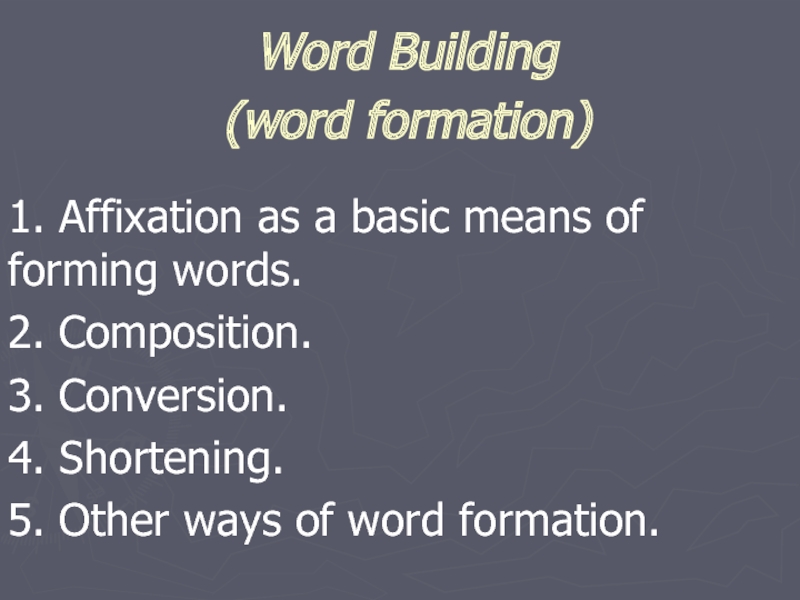
Слайд 2Scientists usually distinguish:
affixation,
composition,
conversion,
abbreviation (shortening, clipping, acronymy),
back
formation (disaffixation),
sound interchange and distinctive change,
onomatopoeia (sound imitation).
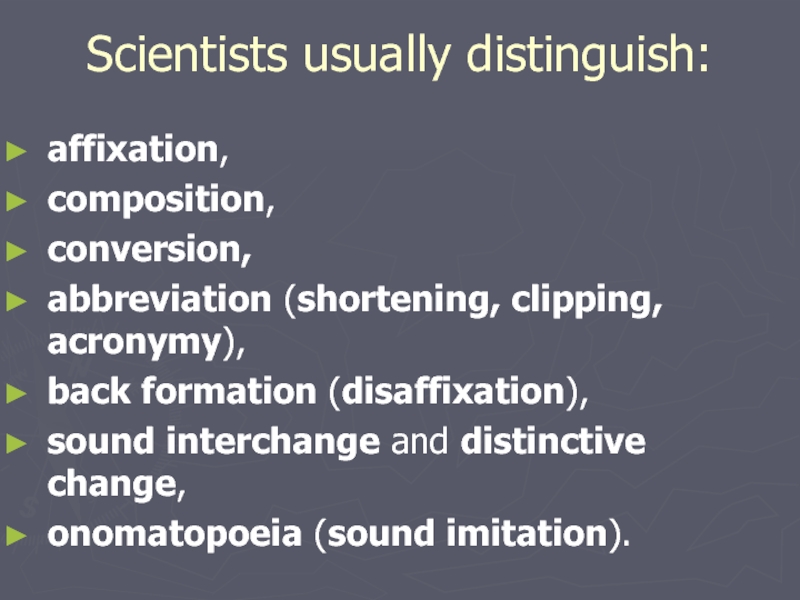
Слайд 3Affixation (the addition of an affix)
is a basic means of
forming words in E.
A prefix is an affix attached to the front of its base.
A suffix is an affix attached to the end of its base.
An infix is a type of affix that occurs within a base of a word to express such notions as tense, number, or gender٭.
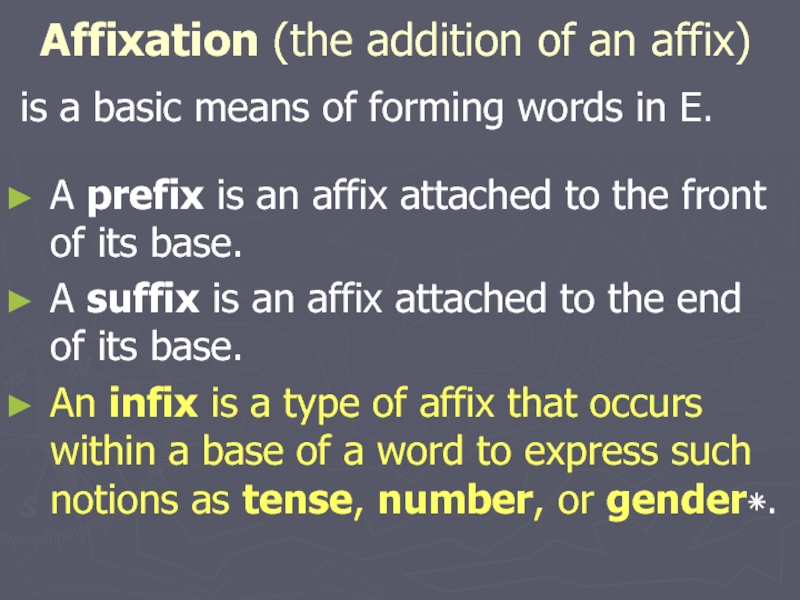
Слайд 4Affixation = suffixation + prefixation
In Modern English, suffixation is characteristic
of noun and adjective formation, while prefixation is typical of verb formation.
Prefixes modify the lexical meaning of stems to which they are added:
usual – unusual; fit – misfit.
Suffixes don’t only modify the lexical meaning of the stem, but the word itself is usually transferred to another part of speech:
care (n) – careless (adj).
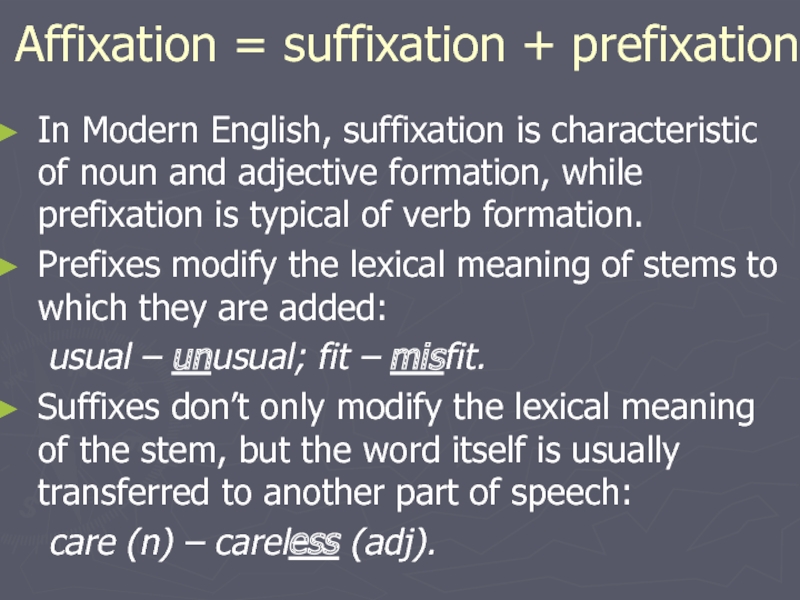
Слайд 5Suffixes and prefixes may be classified along different lines.
The logical
classification of suffixes is according to their origin, meaning, part of speech they form, productivity.
Prefixes can be classified according to their meaning and origin.
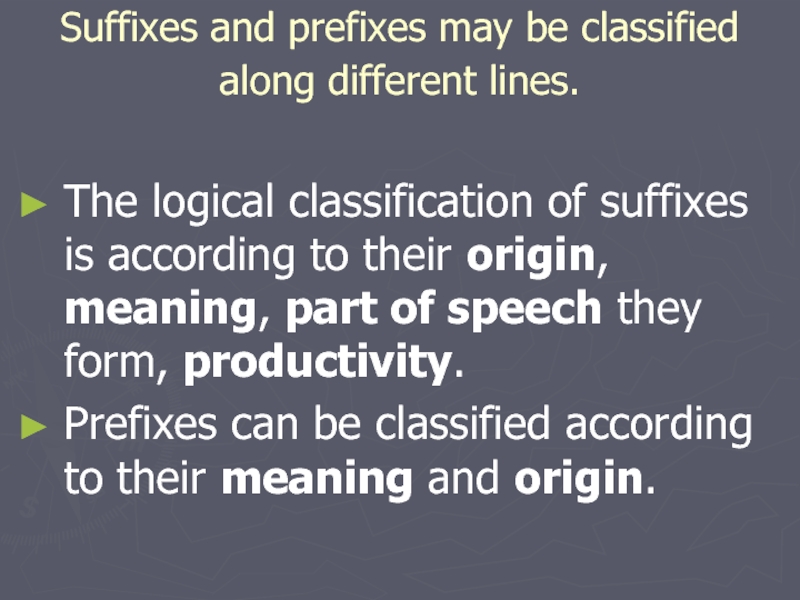
Слайд 6Suffixes
(a) their origin: Romanic (-age, -ment, -tion), Native (-er, dom,
-ship), Greek (-ism, -ize), etc.;
(b) meaning: -er (the agent of the action), -ess (feminine gender), -ence/ance (abstract meaning), -ie and -let (diminutiveness), -age, -dom (collectivity), -an, -ese, -ian (appurtenance), etc.;
(c) part of speech they form: noun suffixes -er, -ness, -ment; adjective-forming suffixes -ish, -ful, -less, -y; verb-suffixes -en, -fy, etc.;
(d) productivity – productive suffixes are -er, -ly, -ness, -ie, -let, non-productive (-dom, -th) and semi-productive (-eer, -ward).
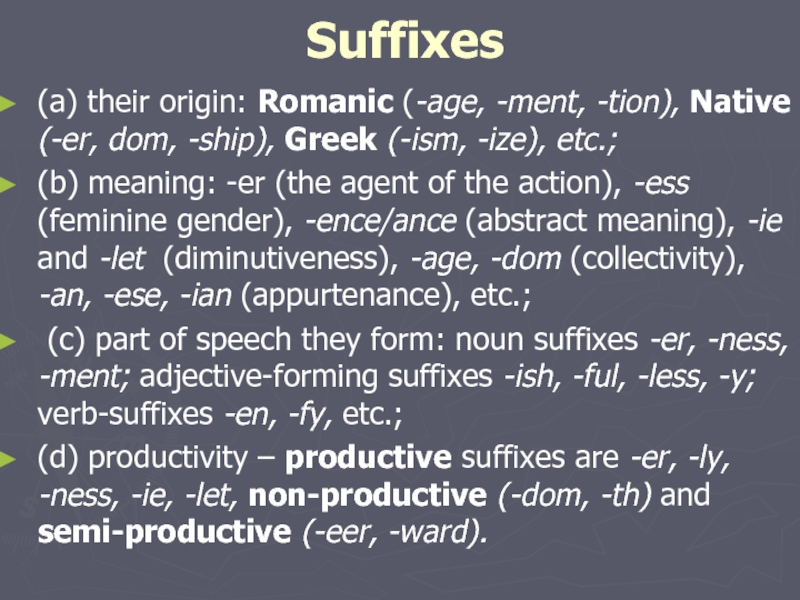
Слайд 7Prefixes
negative (unpack, non-formal, inseparable);
denoting repetition or reversative action (decolonize, rewrite,
disconnect, undo);
denoting time (pre-election), space (interethnic) and degree relations (overwork) or
Germanic (underestimate);
Romanic (ex-wife);
Greek (hypertext).
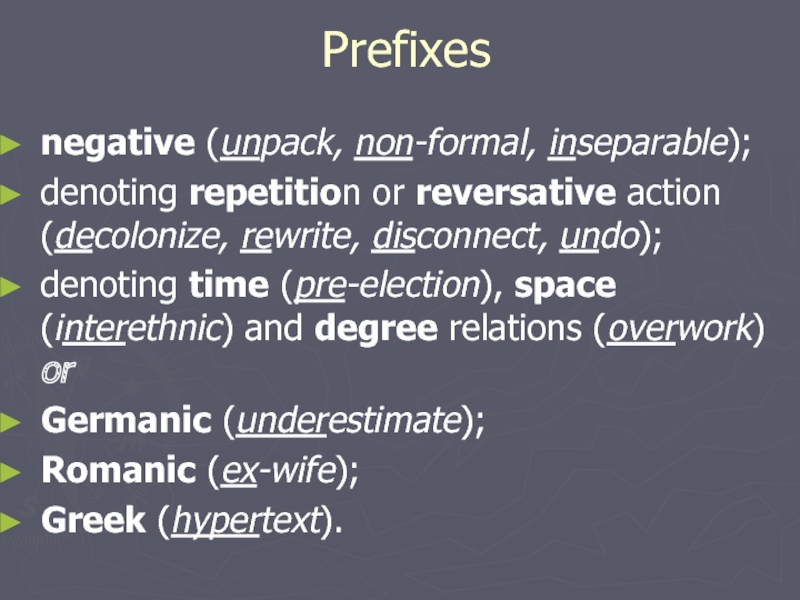
Слайд 8Some linguists distinguish between suffixes and semi-suffixes such as -man (postman);
-burger (fish-burger); -aholic (workaholic) – either affixed words or compound words.
Some prefixes are treated as root morphemes because they are met as words: afternoon – after school; overhead – over the wall. American lexicographers treat such words as compound words, while British lexicographers regard them as affixed words. There are also semi-prefixes such as -mini (mini-plane); -maxi (maxi-taxi); -aero (aerospace); -eco (eco menu), etc.
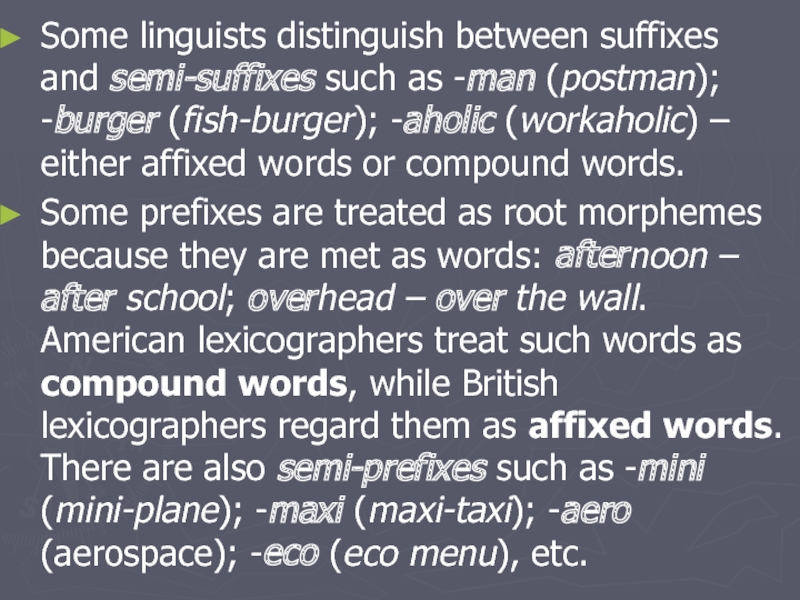
Слайд 9The main function of prefixes in English is to change the
lexical meaning of the same part of speech. However, in ME there are prefixes that form one part of speech from another:
danger (n) → endanger (v),
head (n) → behead (v),
sleep (v) → asleep (stative).
AFFIXATION is a way of word formation consisting in adding an affix to the stem of a word: sixteen, friendship, unkindly, heartless, ex-husband, etc.
